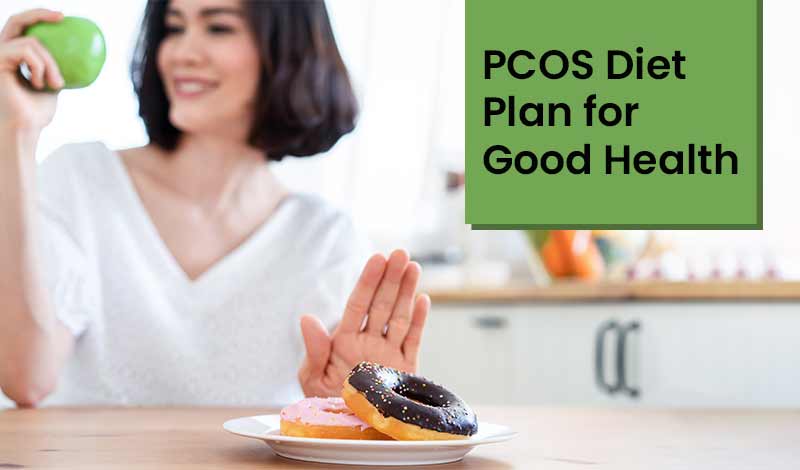
One cannot exaggerate how crucial food is to controlling PCOS (Polycystic Ovary Syndrome). Ovulation, insulin, and androgen hormone levels are all out of balance in PCOS, a hormonal condition that affects females of sexual maturity. Although there is currently no cure for PCOS, controlling the illness and reducing its symptoms can be greatly aided by following a balanced diet. Let us try to find out some information related to the answer to the question, “Can you reverse PCOS with a diet?”
Dietary changes can help manage insulin resistance, one of the main underlying causes of PCOS. It is common for women with PCOS to have elevated insulin levels, which can result in weight gain, an increase in androgen production, and irregular ovulation. Individuals with PCOS can enhance their sensitivity to insulin and reduce related metabolic issues by concentrating on a balanced diet that regulates blood sugar levels. Nutrient-dense, whole foods are prioritized in a PCOS-friendly diet plan, and the intake of complex carbs, lean proteins, and healthy fats is encouraged. It encourages eating meals with a low glycemic index (GI), which has a more gradual effect on blood sugar levels and helps stabilize insulin release. While `limiting processed and sugary meals, eating a mix of fruits, whole grains, vegetables, and legumes gives vital vitamins, minerals, and fiber.
A balanced diet can help control hormone levels, encourage weight reduction, lessen inflammation, and enhance reproductive results, in addition to controlling insulin resistance. It is significant to highlight that while food alone might not totally correct PCOS, it can be a vital part of an all-encompassing therapy strategy, along with other lifestyle changes and medication therapies. Women with PCOS may maintain their general well-being, control their weight, and perhaps even lessen some of the uncomfortable symptoms brought on by the disorder by making informed food decisions. A licensed dietician or healthcare expert can offer individualized direction and help in creating a diet plan suited to a person’s requirements and objectives.
Diet’s Function in PCOS Management
Table of Contents
PCOS therapy involves a significant diet. Insulin, androgen, and ovulation hormones are all out of balance in PCOS, a hormonal condition. A good diet could help manage PCOS, reduce symptoms, and enhance general well-being even if there is no known treatment for the disorder. Insulin resistance is one of the main PCOS treatment issues that diet addresses. As a result of their raised insulin levels, many females with PCOS may gain weight, produce more androgen, or experience irregular ovulation.
For those with PCOS, improving insulin sensitivity and reducing metabolic problems can be achieved by concentrating on a nutritious diet that regulates blood sugar levels. Complex carbs, lean proteins, and healthy carbs are encouraged in a PCOS-friendly diet, which also places an emphasis on complete, nutrient-dense meals While limiting processed and sugary meals, eating a mix of fruits, whole grains, vegetables, and legumes gives vital vitamins, minerals, and fiber. Selecting meals with a low glycemic index (GI), which affects blood sugar levels more gradually, can assist regulate insulin release. Without a professional dietitian in purnia one cannot find a proper answer to the question, “Can you reverse PCOS with a diet?”
Suggested Read: Can Hair Loss Due To PCOS Be Reversed?
In addition to reducing insulin resistance, PCOS women can benefit from a balanced diet by balancing their hormone levels. Certain meals, such as those high in antioxidants and omega-3 fatty acids, may have anti-inflammatory properties and aid in lowering testosterone levels. Improvements in symptoms including acne, excessive hair growth, and disordered menstrual periods may result from this. Another crucial component of managing PCOS is controlling weight, since obesity worsens insulin resistance and hormonal abnormalities. By encouraging balanced eating habits, a calorie-controlled, healthy diet can assist in weight reduction and maintenance objectives. Women with PCOS can find improvements in insulin sensitivity, hormonal balance, and reproductive outcomes by obtaining and maintaining a healthy weight. It is important to remember that food alone can not entirely reverse PCOS. PCOS is a complicated ailment that frequently calls for an all-encompassing strategy, which may include modifying one’s way of life and, occasionally, receiving medical treatment.
Creating a diet that is suited to PCOS
Focusing on nutrient-rich, complete foods that promote the balance of hormones and sensitivity to insulin is key when creating a PCOS-friendly diet. To reduce blood sugar swings, prioritize complex carbs such as whole grains and legumes while selecting low glycemic index (GI) meals. Choose healthy fats like those found in avocados, almonds, and olive oil while including lean proteins like those found in chicken, fish, and plant-based sources. For important vitamins, minerals, and fiber, increase your consumption of fruits and vegetables.
Limit or avoid alcohol, coffee, and processed and sugary meals. Designing a friendly food plan might be made easier with the help of a qualified dietitian or healthcare expert.
What to eat if you have PCOS:
- Citrus fruits, berries, apples, and pears.
- Brussels sprouts, broccoli, cauliflower, and leafy greens
- Whole grains include whole wheat, quinoa, brown rice, and oats.
- Legumes, salmon, tofu, chicken breast, turkey, and other lean proteins
- Healthy fats include avocado, almonds, seeds, and olive oil.
- Chia seeds, beans, lentils, and flaxseeds are foods high in fiber.
- Greek yogurt and almond milk are low-fat dairy products or dairy substitutes.
- Herbs & seasonings: ginger, garlic, cinnamon, turmeric
Foods to restrict or avoid when following a PCOS diet:
- White rice, white bread, and sugary cereals are foods with a high glycemic index (GI).
- Packaged snacks, desserts, and sugary drinks are examples of processed and sugary foods.
- Fried meals, processed snacks, and commercial baked items all include trans fats.
- Dairy products: milk, cheese, and ice cream (if intolerant).
- Wheat, barley, and rye all contain gluten if sensitive.
- Alcohol: Consume it in moderation or not at all.
- Limit your consumption of energy beverages such as tea, and coffee.
Suggested Read: Can PCOS Be Reversed? Detailed Answer
Take the help of a registered dietitian to find the answer, can you reverse PCOS with a diet? Individual reactions to particular meals might differ, so it’s vital to be aware of your own tolerances and seek out individualized advice from a certified dt. Rukhsana Azhar or healthcare provider.

Hello My Name is Dt. Ruksana Azhar and I am a certified dietician and providing online & offline services for Weight Management, PCOS/PCOD Management, Diabetes Management , etc. I have 12+ years of experience in the Apollo Hospital Delhi , Max Super Specialty Hospital Delhi, Lilavati Hospital Mumbai and VLCC healthcare Mumbai. I loves to write healthcare and lifestyle related blog. My favorite part of being a doctor is the opportunity to directly improve the health and wellbeing of my patients and to develop professional and personal relationships with them.



